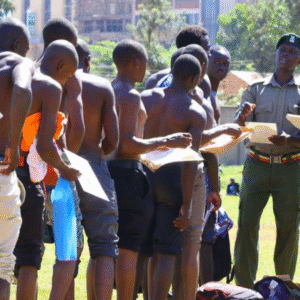Court Issues New Directives on National Police Recruitment
Share
The Employment and Labour Relations Court has reaffirmed its suspension of the recruitment of 10,000 police officers, extending the order until October 30, 2025, when a ruling on the legality of the exercise will be delivered.
The suspension follows a petition filed by former legislator Harun Mwau, who challenged the National Police Service Commission (NPSC) over what he described as an unconstitutional recruitment process conducted without the approval of the Inspector-General of Police (IGP).
Delivering the latest directive on October 21, Justice Wasilwa ruled that the earlier conservatory orders halting the recruitment would remain in effect.
“The current position will be maintained pending the court’s determination on October 30, 2025,” Justice Wasilwa said.
Petition Challenges NPSC Authority
Mwau’s petition, filed under case number E196 of 2025, has reignited debate over control of the National Police Service.
He argues that under Article 245 of the Constitution, the Inspector-General holds exclusive authority over employment, promotions, suspensions, and dismissals within the police service.
He maintained that the NPSC acted “beyond its mandate by launching the recruitment drive without consulting the IGP.”
The recruitment exercise, which was scheduled to run from October 3 to 9, 2025, was suspended earlier on October 2 through interim orders issued by Justice Byram Ongaya, who emphasized the need to protect the integrity of the proceedings.
“The suspension remains in effect to preserve the integrity of the proceedings and prevent any prejudice to the parties before judgment,” Justice Ongaya ruled.
Also Read: Nyeri Governor Mutahi Kahiga Resigns
Courtroom Positions and Constitutional Arguments
During the hearing, Inspector-General Douglas Kanja, backed by the Attorney-General and the National Police Service (NPS), supported Mwau’s petition.
The Attorney-General’s office, represented by Principal State Counsel Ernest Kioko, defended the Inspector-General’s constitutional independence, arguing it is essential for maintaining discipline and professionalism in the police ranks.
“The Inspector-General’s independence in employment matters ensures accountability and effective command within the National Police Service,” Mr Kioko told the court.
According to Mwau, the Constitution explicitly directs that “recruitment of members of a national security organ is to be carried out by that organ itself, and no other body.”
He added that the NPSC’s actions risk undermining the structure that ensures operational independence of the National Police Service.
Also Read: Kenya-Uganda Expressway Declared Feasible and Ready for Investment
NPSC Defends Its Role
In its defence, the NPSC, through its lawyers and in submissions supported by the Attorney-General, insisted that the recruitment process was conducted in line with the Constitution and established procedures.
The Commission maintained that it retains the constitutional authority to manage human resource functions in the police service, including recruitment, promotions, and transfers.
However, the case has exposed deep-seated institutional tensions between the IGP and the NPSC over who wields the final say in staffing the country’s police service, a matter now squarely before the courts.
The Employment and Labour Relations Court is set to make a final determination on October 30, 2025, a ruling expected to have significant implications for the governance and autonomy of Kenya’s security institutions.
Follow our WhatsApp Channel and WhatsApp Community for instant news updates

Applicants during a past police recruitment exercise. PHOTO/FILE.
You Might also Like








